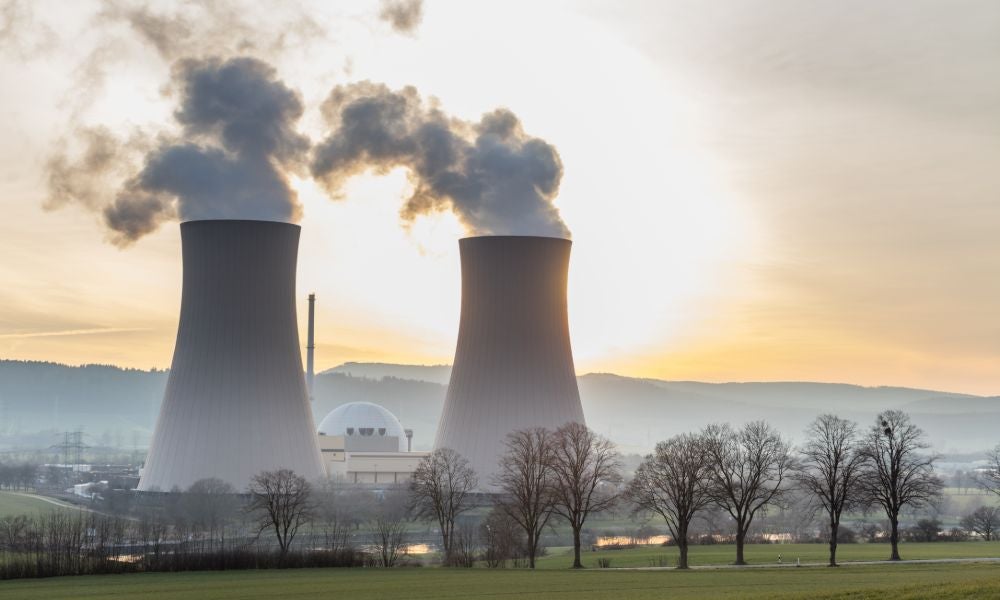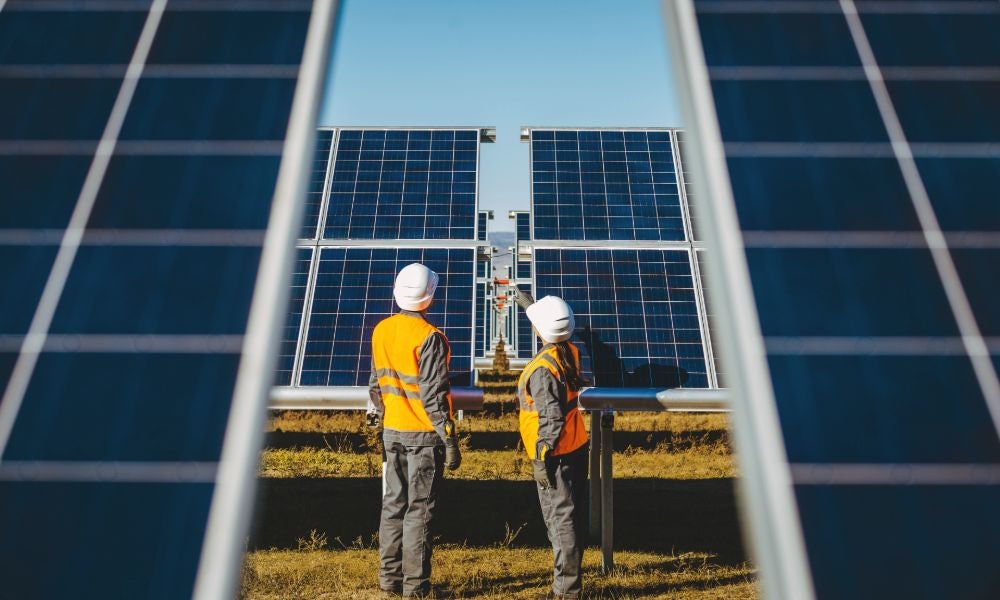Why clean energy sovereignty matters for our economic future
With global trade tensions rising and clean energy supply chains under strain, Australia's real challenge is how fast and strategically it can lead the energy transition
The world is shifting. Energy is no longer just about power – it’s about identity, security, and the future. Australia has a choice: stay a supplier of raw materials or become a leader in clean energy.
That was the core message from a panel hosted by UNSW Founders and the UNSW Energy Institute. Moderated by Dani Alexander, CEO of the UNSW Energy Institute, the panel featured Mac Thompson, Co-founder and COO of Fugu Energy; Professor Elizabeth Thurbon, Deputy Head of School in the School of Social Sciences at UNSW Sydney, and lead investigator on the Green Energy Statecraft Project; and David Leitch, Principal at ITK Services Australia and co-host of the Energy Insiders podcast.
Clean energy is a national security multiplier
The conversation opened with Professor Elizabeth Thurbon framing clean energy as not just a climate imperative but a geopolitical one.
“When you build a renewable energy system, it is an absolute national security multiplier,” said Prof. Thurbon. “Because when you build a renewable energy system, you boost energy security by reducing fossil fuel reliance. You boost economic security by creating new green high-wage, high-skilled jobs. You boost environmental security because you reduce pollution and address climate change, and you also boost Social Security by creating new jobs.”
She added that renewables enhance a nation's international influence. “You boost geo-strategic security because you enhance your international status and prestige and attract new allies.”
Learn more: How Australia can play in – and win – the energy transition
While climate and energy policy debates in Australia have historically focused on emissions and costs, Prof. Thurbon argued for a broader view – one that sees clean energy as a foundation for economic resilience and diplomatic strength.
However, she acknowledged that markets alone won't deliver the transformation needed. “This isn’t about picking winners,” she said. “Governments offer support, but it’s conditional on milestones and success. So winners actually pick themselves.”
She proposed that strategic government procurement could play a catalytic role. “Even if you issued just one contract for a very large green iron project, it would be enough to give the investors that certainty,” she said.
Redesigning Australia's industrial model
According to Prof. Thurbon, Australia’s reliance on fossil fuel exports is no longer a viable long-term strategy. She called it both a risk and an opening for transformation.
“It created an enormous risk for us, because it's pretty much rendered non-viable our existing economic model, which is just digging up and shipping out commodities, mainly fossil fuels,” she said. “Huge risk to our existing economic model and a huge opportunity, massive opportunity to actually transition away from brown commodities and to manufacture clean commodities.”
She also offered a tangible example: “We could double our iron ore exports if we stop exporting brown, regular iron ore and export green iron ore.”

Despite market disruptions such as tariffs, the underlying momentum in global clean energy markets remains strong. “They’re not going to stop driving down renewable energy costs, which make renewables now the world’s cheapest source of energy. They’re not going to stop other countries now seeking to emulate [the renewable energy scale-up].”
Trade friction, particularly under the Trump administration, may have caused volatility, but it has also created space for others to move quickly (including Australia).
“They do create new opportunities, though – capital flight is one from the US,” she said. “And it also created instabilities in the region, this growing sense that Australia needs to look to our region for our security and to deepen our partnerships with countries like Korea and Japan. And in that kind of clean commodity space, that's a huge opportunity.”
In this context, energy policy is no longer just about decarbonisation – it’s about shaping the next phase of Australia’s economy. “It is there for Australia if we're smart enough to grasp it,” she said.
Critical minerals: Strength or stranded asset?
David Leitch, Principal at ITK and an experienced energy analyst, said Australia’s natural endowment – particularly in lithium and iron ore – is a major asset. But he warned that without investment in processing and production, the opportunity could be lost.
“Australia’s history is that we’re good in services, and we’re very good in raw materials production,” Mr Leitch said. “I see nothing wrong with being good at raw materials production myself. We’re the world’s best at iron ore extraction, and some of the world’s best at coal extraction and even coal seam gas. We’re a world leader at [those] and we’ve got great skills.”
Learn more: Why Australia holds the roadmap to lead the energy transition
But to move up the value chain, Australia must turn those resources into finished or semi-finished goods. “How can we translate our expertise and productivity into that into other areas? And of course, the obvious opportunity is value adding.”
But the path is fraught with complexity. “We’ve tried to add some value by building some lithium hydroxide plants here to process the spodumene, and it’s been a complete and utter disaster,” Leitch said. “The people who invested in that have lost hundreds of millions of dollars.”
“It’s not just a question of having a nice, bright idea that you can add value and therefore the money is going to flow in,” he continued. “It’s a lot harder. You have to realise that countries like China [are] extremely good at what they do, and we have to pick very carefully what it is that we’re going to do, what we want to be doing.”
He pointed to the possibility of green iron or hydrogen-powered manufacturing as future plays, but warned of their capital intensity and uncertain returns.
“If we have exactly the right hydrogen price, and it’s just a little bit less than in China, we could potentially build quite a big industry,” he said. “If you’re asking me as an investment banking analyst, do I want to invest in that today, or do I want to invest in a cable taking electricity from Darwin to Singapore? You’d have a lot of guts. It’s a very, very big financial gamble with a very uncertain future.”

Mr Leitch said government should not attempt to pick specific winners but rather help create the conditions in which winners can emerge. “It’s a role for government where they wait for winners to emerge and maybe open the path...”
He concluded with a note of urgency: “It is an absolute challenge that’s going to take probably 20 years to realise – to replace those coal and gas exports,” he said. “And of course, we have to start now.”
Solar potential: A global edge Australia hasn't yet used
For Mac Thompson, Co-founder and COO of Fugu Energy, Australia’s solar potential is perhaps its most under-leveraged advantage.
“The whole basis, I think, for solar in general, is that you can get the lowest, leveled cost of energy by getting cheap flat land in a high solar irradiance area,” he explained. “And Australia has a lot – a lot – of very cheap flat land, and it's hard to find that amount of land anywhere else in the world.”
“If you jump on any solar irradiance website and have a look of where the best spots in the world are to produce solar power, just about every spot has some sort of geopolitical problem, except for Australia,” he added. “And that gives us a tremendous advantage.”
Mr Thompson sees potential not just in exporting energy but in using clean, cheap electricity to electrify domestic industries. “That has global benefits, not necessarily with exporting electricity by HVDC [High Voltage Direct Current] cable, but for making hydrogen, for electrifying everything, and generally transforming our economy into one that's totally self-aligned.”
Subscribe to BusinessThink for the latest research, analysis and insights from UNSW Business School
He also argued that industrial strategy – rather than pure market logic – has helped other countries scale clean tech successfully. “One of the reasons that China is where it is at the moment is that it does pick winners,” he said. “And it doesn't pick an individual project but it's an industry, and it says we're going to support that and see how it goes.”
While he acknowledged that Australia is starting to take similar steps, more conviction is needed. “I think the more recent Labor government’s programs have tried to do that, probably not with as much gusto as we would want.”
He pointed to the US Inflation Reduction Act (IRA) as a bold example: “The IRA is still around, believe it or not, and it has all the hallmarks of one of those picking-a-winner type nation-building activities.”
Industrial reinvention is possible, he urged, but only if the will exists. “There was a lot of talk about peak oil and how everything relied on the Middle East. And then, much to the world and the climate’s detriment – they discovered enhanced oil recovery and fracking, and now the US has become completely energy self-sufficient with fossil fuels,” he said. "There’s no reason why we can’t do a similar thing with clean energy."
